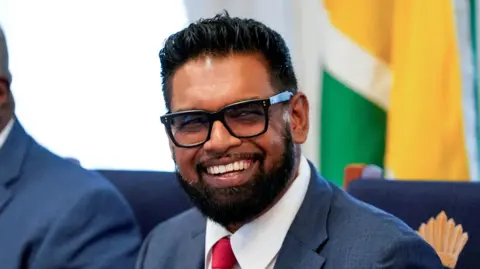In an unprecedented move, Venezuela's President Nicolás Maduro is preparing to hold elections in the Essequibo region this Sunday, an area rich in oil resources but internationally acknowledged as belonging to neighboring Guyana. This contentious decision comes as Maduro strives to solidify his grip on power amidst pervasive dissatisfaction within Venezuela and dwindling support among military ranks.
The Essequibo territory, which is home to approximately 125,000 inhabitants, is widely considered to be part of Guyana, a country of roughly 800,000 citizens. This electoral process aims to appoint a governor and legislators for Essequibo, possibly as a strategy for Maduro to showcase his authority to both domestic and international audiences. By attempting to claim legitimacy through these elections, he seeks to divert attention from his previous disputed presidential election victory, which was met with skepticism and rejection by various countries, including the United States.
Analysts express concerns regarding the implications of such elections in a region neither Venezuela nor Maduro has the right to govern, potentially igniting tensions between the two nations. They suggest that this move is also a response to troubling reports indicating that a significant fraction of military personnel voted against him in previous elections, portraying a stark picture of declining loyalty within his once-unified support base.
With no official acknowledgment or evidence substantiating Maduro's claim to electoral success in the past, the upcoming elections in Essequibo are drawing critical scrutiny and could exacerbate diplomatic strains in an already politically divided South America.
The Essequibo territory, which is home to approximately 125,000 inhabitants, is widely considered to be part of Guyana, a country of roughly 800,000 citizens. This electoral process aims to appoint a governor and legislators for Essequibo, possibly as a strategy for Maduro to showcase his authority to both domestic and international audiences. By attempting to claim legitimacy through these elections, he seeks to divert attention from his previous disputed presidential election victory, which was met with skepticism and rejection by various countries, including the United States.
Analysts express concerns regarding the implications of such elections in a region neither Venezuela nor Maduro has the right to govern, potentially igniting tensions between the two nations. They suggest that this move is also a response to troubling reports indicating that a significant fraction of military personnel voted against him in previous elections, portraying a stark picture of declining loyalty within his once-unified support base.
With no official acknowledgment or evidence substantiating Maduro's claim to electoral success in the past, the upcoming elections in Essequibo are drawing critical scrutiny and could exacerbate diplomatic strains in an already politically divided South America.




















